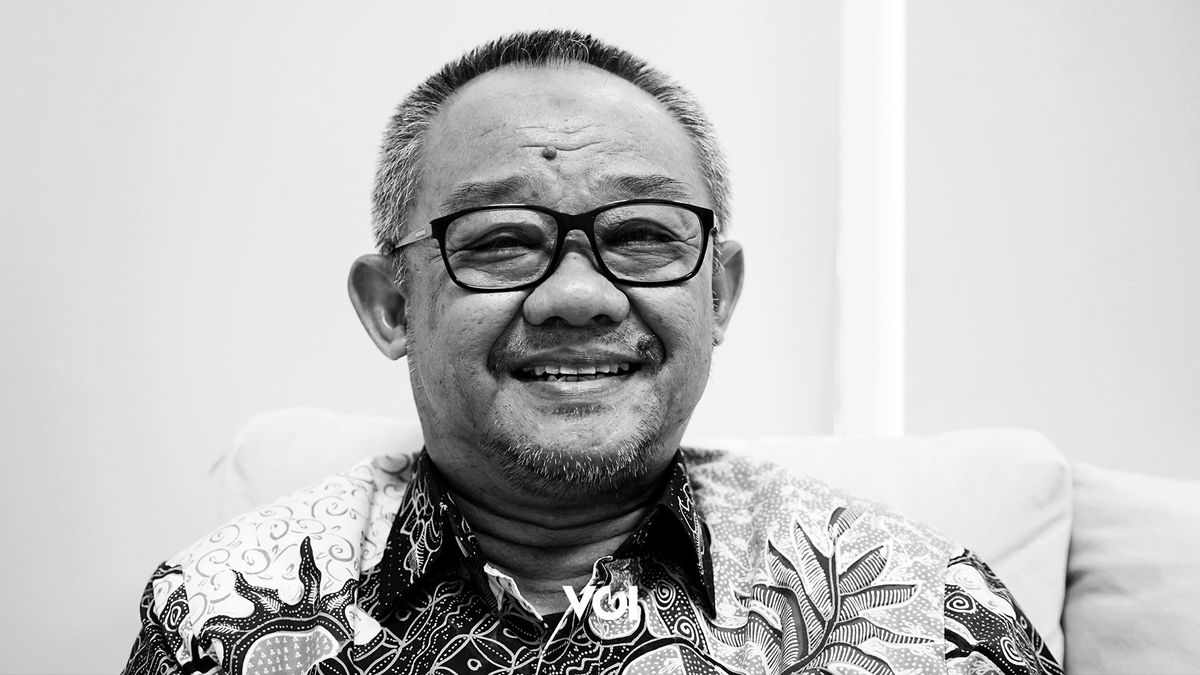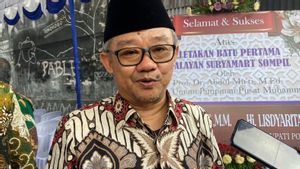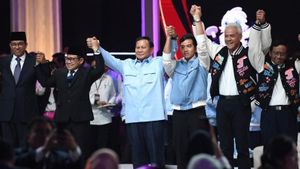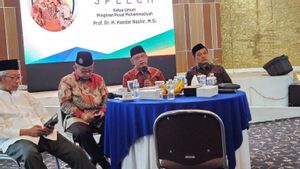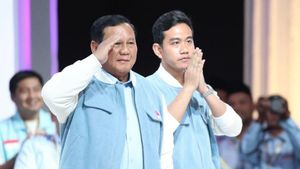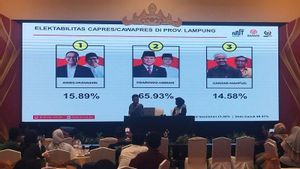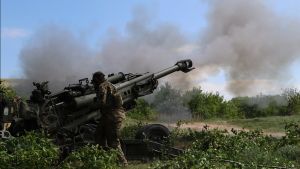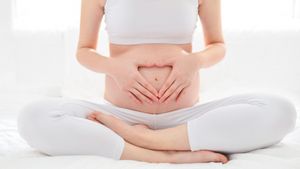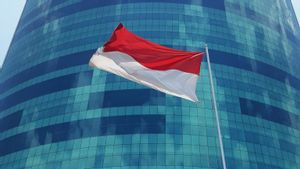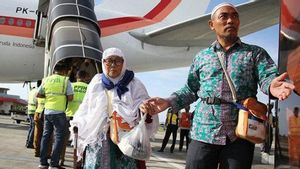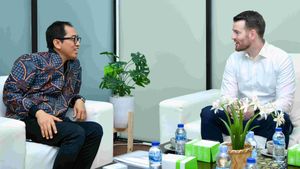The Indonesian nation has just held a democracy party, a five-yearly event that has received world attention. According to the Secretary General of PP Muhammadiyah Prof. Dr. Abdul Mu'ti, M.Ed, the 2024 presidential and legislative elections generally went smoothly, the temporary count for candidate pair number 2 is ahead of candidate pairs number 1 and 3. However, there are several notes that can be used as a reference so that the election in the next five years will be even better.
***
As many have predicted, candidate pair number 2 Prabowo and Gibran Rakabuming Raka will be the winners in this presidential election. And this prediction came true, at least from the results of the quick count and preliminary count of the General Election Commission (KPU), which is still ongoing. Meanwhile, candidate pair number 1 Anies Baswedan and Muhaimin Iskandar are in second place. And candidate pair 3 Ganjar Pranowo and Mahfud MD are the caretakers.
According to Abdul Mu'ti, this relatively smooth and safe election is something to be grateful for. "Thank God, the public participated quite highly in the presidential and legislative elections this time. "In general, the process ran smoothly, safely, orderly, peacefully and there were no significant incidents that disrupted the voting process," he said.
Even though the election went smoothly, there were several points that were noted by the man who is a professor at the Jakarta State Islamic University. Firstly, democracy in Indonesia is still lacking value. “I see that financial power is still something that is so dominant that democracy has lost its spirit. "I made a statement that what was happening was a zombie democracy, a democracy that was devoid of values," he said.
The second thing he noted was the use of social assistance for pragmatic purposes to support one of the candidate pairs. "Many people think that social assistance has a political content when it is given ahead of the voting. And the provision of social assistance should be in accordance with data from the Ministry of Social Affairs and based on need. "That's why people consider social assistance to be political propaganda for certain candidate pairs supported by President Jokowi," he said.
The third is unaudited campaign funds. “One of the weak points of our campaign model is that the incoming campaign funds and their use are not openly audited. "In fact, the regulations (UU) exist," he said to Edy Suherli and Rifai from VOI who met him on the Jakarta Muhammadiyah University campus, Cirendeu, South Tangerang not long ago. Here's the excerpt.

We have just held the vote, how do you see this election?
Thank God, the public participated quite highly in the presidential and legislative elections this time. In general, the process ran smoothly, safely, orderly, peacefully and there were no significant incidents that disrupted the voting process. We are grateful, hopefully this can be part of the mirror of how the Indonesian nation can be democratic in a polite manner and can also show the world how Indonesia still has a glimmer of hope for a better democratic future.
That's the positive side, what are your notes on the flip side?
Indeed, there are many notes from some circles that there are still indications that these processes are not taking place fairly. I also see that financial power is still something that is so dominant that democracy has lost its spirit. I once made a statement that what was happening was a zombie democracy, a democracy that was devoid of values. Namely democracy whose orientation is only winning and losing. Our democracy is still very power oriented. This is what I think needs to be noted. Then I saw that society had not yet moved away from more substantive democracy. The choice is still based on primordial considerations and considerations that are sometimes very pragmatic.
I see symptoms, some of our people choose because of orders, vote by order. This has become an open secret and this is what needs to be improved so that our democracy in the future can be more substantive and we can build a democratic culture as a prerequisite for being able to call our country democratic.
So our country is not yet democratic?
What exists now is that Indonesia is implementing democracy, but is not yet a democratic country. This is our challenge together. But in terms of implementation, compared to other countries where democracy is bleeding, thank God we celebrate democracy with joy and society also seems to have become more mature and more open to accepting different choices.
One of the highlights is the social assistance which was intensively distributed ahead of the voting, how do you see this reality?
We see this social assistance as when we are fasting, there is a term for social assistance takjil, immediately after the time to break the fast. There is also something called tanazul social assistance. When carrying out the Hajj pilgrimage, the congregation can perform the tawaf ifadah first and then perform the pilgrimage later. So such practice is called tanazul.
Many people think that social assistance has a political content when it is given ahead of the voting. And the provision of social assistance should be in accordance with data from the Ministry of Social Affairs and based on need. That's why people consider social assistance to be political propaganda for certain candidate pairs supported by President Jokowi. In society there are also jokes about material approaches like this to get votes with the expression NPWP; piro wani piro number (what number, how dare), hehehe, and many other terms and puns. There should be an effort so that there can be a change from this materialistic approach. This is political bribery that we must avoid.
What other notes do you have regarding yesterday's campaign?
One of the weak points of our campaign model is that incoming campaign funds and their use are not openly audited. Even though the rules (law) exist. In America they are orderly about this. In the past, an Indonesian conglomerate was busy because he contributed to one of the American presidential candidates.
Then public participation in democracy is still passive, not active. Another thing is that the costs of our politics are very high, that's why there are jokes that people who don't have money will die if they force themselves into politics (becoming a legislative candidate, for example). Those who succeed are usually financially strong. Then the issue of dynastic politics not only happened to Jokowi and his children, but also affected other politicians in various political parties in the country.

But what they did was not against the rules?
Yes, it's true that they didn't violate the law, but ethically they did, so it's a matter of what's appropriate and what's not appropriate. Sorry if in Javanese society there are terms like right and pener. It's true that it doesn't violate the rules, pener also doesn't violate the rules but it's not appropriate. In many ways we have to move in that direction, towards ethics. In several countries, if an official is suspected of being corrupt, even though it has not been legally proven, he or she has already resigned from public office. There is a sense of shame if you still hold public office.
In Islamic teachings, shame is part of faith. If someone no longer has shame, it means that their faith has gone nowhere. This is what we need to build in the context of democracy. So it's not a matter of violating or not violating. And one of the strengths of democracy is wider public participation, not just monopolized by a certain group of people. That's why elections need to be direct, if we talk about efficiency it might be inefficient and complicated.
Three days before the voting the documentary Dirty Vote appears, how do you see this?
In the context of freedom of expression and opinion, the film is fine. However, the problem is that the publication was right before the voting, so it was suspected that certain candidate pairs were being attacked. That's what I saw. And if you want to be open, a lot of criticism has been raised regarding the decisions that occurred at the Constitutional Court and that provided a red carpet for Gibran to run in the presidential election. Legally, all procedures have been followed, there have been lawsuits and proceedings. But it was problematic when the decision was designed to allow Gibran to become vice presidential candidate. A month before the controversial MK hearing, there was already circulation about this plan. On that day several lawsuits were decided, but one was rejected but one was granted. I was asked to comment by journalists, but I didn't want to answer because there was a leak. It turned out to be true, there was a lawsuit that was granted with the narrative that he could run as a presidential/cawapres candidate even though he was not yet 40 as long as he had served as regional head through an election process. That clearly paved the way for Gibran.
This means that this is a record in our democracy and law enforcement. This is not a matter of violating or not violating, but a matter of propriety. A national magazine discussed this issue at length before the film Dirty Vote was released. The response of political figures was divided regarding this film, with those who felt they had benefited and supported it and those who felt they had lost, they opposed this film.
The quick count of the voting results has appeared, how do you see the results?
My note is that the survey institutions that carried out the quick count had already conducted the survey before the voting. However, the results of the quick count were different from the survey conducted before the voting. Then, almost all survey institutions have relatively the same results. Candidate pair 1 is in second position, candidate pair 2 is in first position and candidate pair 3 is in third position. Now the bet is on which survey institution will have the most accurate calculations.
And what's interesting is that the public is relatively calm in responding to the results of this quick count, even though we have to patiently wait for the results of the manual count from the KPU to determine who will be the winner.
SEE ALSO:
Even though there is no final decision from the KPU yet, euphoria has emerged from candidate pair 2, how do you see it?
It's okay to be happy, but don't overdo it. If we at Muhammadiyah joke like this, the results of a quick count are like hisab (counting), while the results of the KPU's manual count are rukyah (seeing). So just be patient until the work is really done and you can see the results.
We then call on those who feel they have won not to be euphoric, and those who feel they have lost to be humble (accept it sincerely). And don't mobilize the masses to express disappointment with the results of the presidential and legislative elections. Because there could be a risk of horizontal conflict and mass violence that we don't expect. If you are dissatisfied with the election results, please file a lawsuit through the constitutional route.
Next, we wait for the winning candidate pair or legislative candidates to get ready to fulfill the promises made during the campaign?
As citizens we must be loyal but critical of government policies. This means that whoever is elected is the one we must accept and respect. Because that is the people's choice. Even though the leader is not the candidate we voted for at the polling station, we have to accept it as the political reality of the presidential election results. As a consequence, our democracy must accept those who are elected as president and vice president.
Criticism is done in two ways, first, how to observe how they carry out their campaign promises. And secondly, ensuring that those elected do not violate the constitution in carrying out their duties.
As an organization, Muhammadiyah does not engage in politics, through whom does it channel its political aspirations?
Muhammadiyah is not involved in practical politics, so in this regard there are three things we do. Firstly, Muhammadiyah plays the role of opinion maker, how Muhammadiyah conveys ideas for state administration or matters related to state and national issues. The second is to carry out political lobbying with those who have authority as state administrators.
Then thirdly, political pressure, in certain cases we carry out basic political principles, for example in certain contexts, we carry out judicial reviews of several laws that are deemed to conflict with the constitution. Or statements that criticize the government are part of Muhammadiyah's role as a non-political organization in carrying out political roles. We also entrust the aspirations of the association through figures who can accommodate Muhammadiyah's interests. We provide support to cadres to play a role in the political field. Muhammadiyah members are free to take part in any political party. So Muhammadiyah does not do politics, but its agents are everywhere.
What is your message and hope for the president and vice president-elect?
We really hope that he who is elected is the President of the Republic of Indonesia, not the president of the political party he supports. His loyalty to the party is complete, he must be above all groups and parties. Then in my opinion we really need to abandon the winner takes all philosophy, the winner will take everything. So it is also necessary to give space to those on the other side, who have the ability and integrity. So after the election, it's time for everyone to unite to develop Indonesia. What President Jokowi did in the second term by inviting Prabowo and Sandiaga Uno to join the cabinet is the most obvious example.
We also hope that the elected president and vice president will be leaders who are always close to the people, not just close when they want to be. Throughout his term of office he always paid attention to and was close to the people.
Abdul Mu'ti, Gardening and Listening to Small Communities

Apart from his busy schedule as a lecturer, professor and as Secretary General of PP Muhammadiyah, Prof. Dr. Abdul Mu'ti, M.Ed, spends his time at home gardening and raising livestock. He is fortunate that at his residence in the Pondok Cabe Ilir area, Pamulang, South Tangerang, the situation is still favorable for gardening and keeping home livestock such as chickens, ducks and singing birds.
"I am the son of a farmer and come from the village, so I continue my father's habits. When I have free time at home I plant fruit, vegetables and flowers in the yard. "I also raise free-range chickens," said the man born in Kudus, September 2 1968.
Why choose to raise chickens? "The thing is, I still miss the atmosphere in my hometown in Kudus, Central Java. In the morning before the sun rises, I always listen to the rooster crowing which wakes us up from deep sleep. "The cock's crowing that broke the morning silence was very beautiful and serene," continued the IAIN S1 Walisongo (1991) alumnus.
Apart from the rooster which sings its melodious crowing every morning, Mu'ti is also entertained by the chirping of the birds he keeps in his yard. "In big cities like Jakarta, it is difficult to find singing birds in the wild. There are almost no trees that can be used as nests for flocks of birds. "There is still an atmosphere like that in the outskirts of Jakarta," said the man who completed his Master's studies at Flinders University, Adelaide, Australia (1997).
What's even sadder, he continued, is that the remaining birds are threatened by illegal hunting. "If that's the case, how else can we listen to the natural chirping of birds in the wild? There are no more birds nesting in trees because the trees are sparse. Even if there is, the condition is already threatened. Because it is difficult to hear natural chirping, I keep several birds in the yard. "I really miss that kind of atmosphere," said Mu'ti, who completed his PhD at UIN Syarif Hidayatullah (2008).
Small Communities

Because he wanted to experience the friendliness of rural nature like in his hometown, Abdul Mu'ti chose to live on the outskirts of Jakarta. He bought land which became his residence in unity with the community.
Mu'ti chose to live with alit (small) society, not elite society who usually live in luxury housing complexes. “I chose to live in the village, not in a housing complex. "So I can gather with elite society, not elite society," he said.
It is not uncommon for him to meet and chat with his neighbors when he comes home from campus. Likewise, in the morning while walking, he can chat with his neighbors. "I want to be an ordinary human being where I live," continued the man who took a short course in Government and Sharia at the University of Birmingham, England (2005).
In making friends, he has the principle of making friends with as many people as possible. “Our life will have meaning if we have as many friends as possible. I usually use motorbike taxi services when I really need it. And that's when I can sometimes hear unique and funny stories from them," said Mu'ti, who built a badminton court near his house as a means of gathering and exercising with neighbors.
Even though he doesn't tell the public who he is, sometimes there are people who know. "I think I've seen you appear on television," Mu'ti imitated the words of her regular barber.
By interacting with the community, he can absorb and listen directly to what is being complained about. The problem is that he listens without barriers and barriers that could create bias.
With Family

Even though he is busy with assignments on campus and the Muhammadiyah organization, he still makes time for his wife and children. According to Mu'ti, the key word is communication. In every activity he informs the family so they can find out.
“Maintaining relationships with family is very important. Even though I have a lot of activities, I still communicate and pay attention to my family. When there is a business trip out of town, for example, starting from the airport, boarding, and arriving at the destination city, I inform you. After the activity was over, I also reported it. "That way they know everything I do," said Mu'ti, who has been active in Muhammadiyah from the bottom up to now in the position of Secretary General.
If circumstances permit, he will invite his wife and children to join him on visits and assignments outside the city. "So after completing the main assignment, I will invite my children and wife to explore tourist locations in the city," said the author of the book Muhammadiyah Christianity: the convergence of Muslims and Christians in education.
Abdul Mu'ti is aware that his busy life on campus and also in organizations means that his time is barely used up. Even on weekends there are activities. “Usually Muhammadiyah holds events on weekends. The solution is that I set aside one day a month specifically to be with my family. You can gather, eat together and do other activities with your family. "But sometimes it's already scheduled because there's an important event," he concluded.
"Our democracy is still power-oriented. This is what I think needs to be noted. Then I saw that society had not yet moved away from more substantive democracy. The choice is still based on primordial considerations and considerations that are sometimes very pragmatic,"
The English, Chinese, Japanese, Arabic, and French versions are automatically generated by the AI. So there may still be inaccuracies in translating, please always see Indonesian as our main language. (system supported by DigitalSiber.id)
